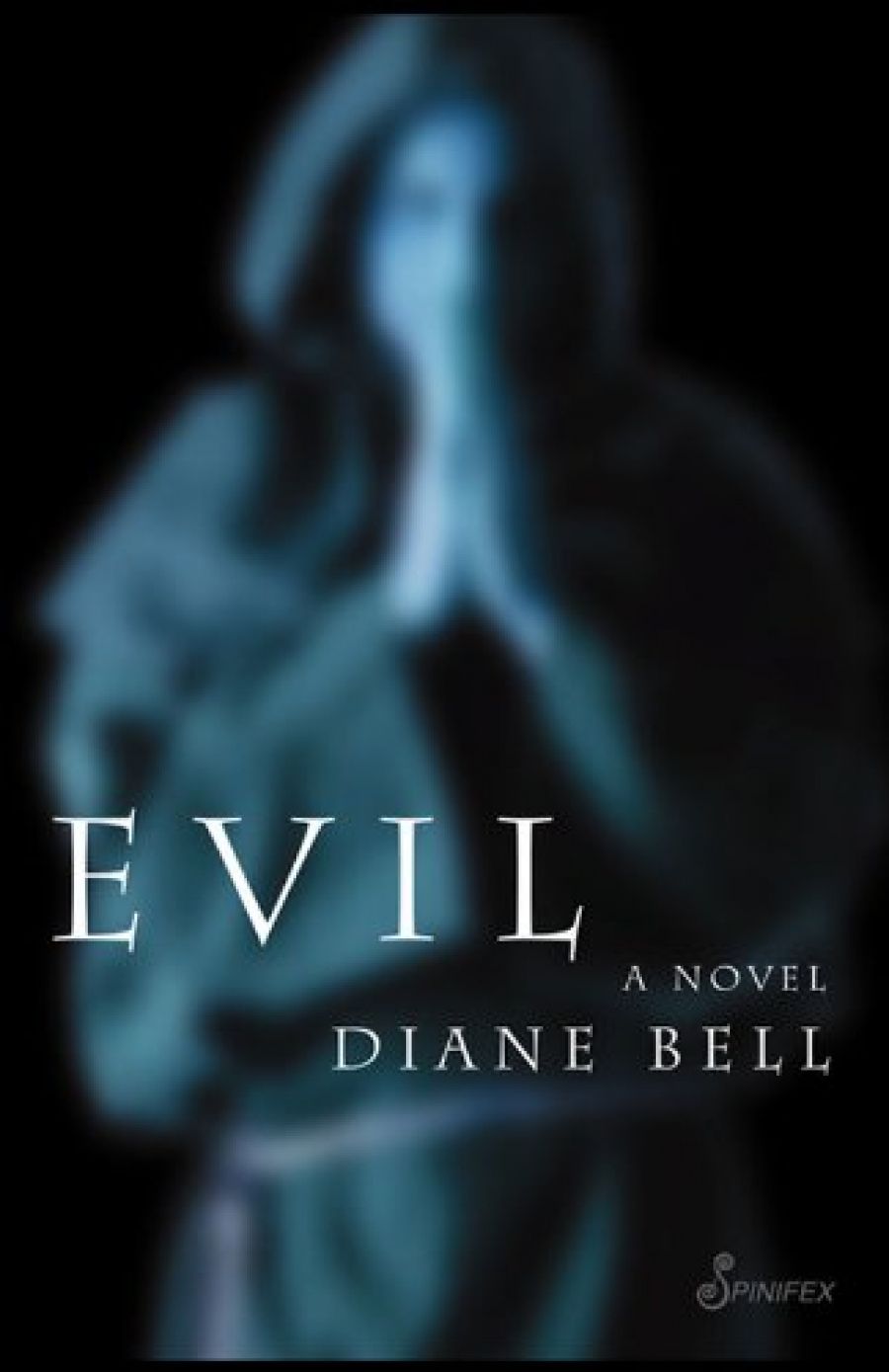
- Free Article: No
- Contents Category: Fiction
- Review Article: Yes
- Article Title: ATN at risk
- Online Only: No
- Custom Highlight Text:
‘Write about what you know.’ This is probably good advice for aspiring writers. Whether it serves equally well for academics turning their hand to prose fiction is put to a severe test by Diane Bell’s first novel. Evil tells the story of an Australian feminist anthropologist who takes up a position at a small Jesuit college in the US. Like many ATNs (Academics Turned Novelists), Bell’s choice of genre is the academic mystery: it is no coincidence that one of the heroine’s favourite writers is Amanda Cross, otherwise known as the feminist critic Carolyn Heilbrun.
- Book 1 Title: Evil
- Book 1 Subtitle: A novel
- Book 1 Biblio: Spinifex, $24.95 pb, 289 pp, 1876756551
- Book 1 Cover Small (400 x 600):

- Book 1 Cover (800 x 1200):

The novel’s heroine is Dee Scrutari who, in addition to writing her next book on women and land reform in Africa, also turns her anthropological eye on her colleagues, ‘this strange tribe of non-reproducing males’. The story of her first few years at St Jude’s is punctuated by her ‘field notes’, questions and comments to herself, set out in an informal Lucida cursive font that quickly becomes something of an irritant. For example, Dee is quick to take up the issue of the college’s child-care policy, and, after an interview with the business manager, Charles ‘Chuck’ Vernon Negotium (most of the names employ this kind of heavy-handed allegory, like Scrutari’s own ‘scrutiny’), she writes:
Hostility to outsiders entrenched. Who is communicating with Negotium about all this?
N.B. fracture lines in old alliances opening up; positions being renegotiated; new generation, new interests.
Most of these notes have a dull, flattening effect on the dialogue or narrative action that precedes them. There is no room in this novel for textual ambiguity or readerly inference, as the implications and nuance of every new development or fragment of information are spelled out for the reader thus. Unfortunately, these ‘anthropological’ notes rarely offer more insight into human nature or institutional politics than an astute reader of detective fiction could provide.
There are mysteries aplenty at St Jude’s, though little urgency about their resolution (Scrutari, after all, has a book to write) until the final few chapters, when explanations and plots and counter-plots unfold with dizzying speed. As Bell’s title indicates, the college is rotten, with bad behaviour of all kinds: prejudice against women; denial of their tenure; sexual exploitation and corruption of various kinds; and a suspicious fatal car accident. A charitable view might be that Evil presents a case study in the kind of institutional culture that can lead to such abuse and violent efforts to cover it up. The traumas related here are intense and devastating; and the feminist rituals of disclosure and healing are also powerful, though somewhat dated. The novel is set in the mid-1990s, rather than in the present; some of its intellectual concerns and political assumptions already seem historical, rather than timely.
Bell’s central character is a bland feminist heroine. If she has faults, they are coded virtues, such as her impatience with the slowness of reform or her ‘high control needs’ (that is, her unwillingness to be dictated to by the men in her life). Scrutari is a great cook, gardener, mother and lover; she is a powerful and independent woman with ‘a passion for social justice’; she makes friends equally with the cleaners and office staff as well as the academics; her work is brilliant; her clothes are stylish; and her insights are welcomed by all but those who are threatened by her perspicuity. Certainly, the narrative voice struggles to find any distance from this character.
In truth, Bell has not fully mastered the arts of engaging narrative perspective or suspenseful narrative. At several points, characters narrate reported conversations between other characters, complete with direct speech and surrounding indirect discourse. This undisciplined method (which Bell’s editor should probably have counselled against) suggests a very limited repertoire of narrative technique, and has a disconcerting effect in a novel that is otherwise narrated in conventional realist mode.
The novel’s prologue briefly introduces a more gothic tone:
Evil oozed out of the closets, into the hallways, onto the table set for dinner: red meat, heavy wine, creamy sauces, stewed brussels sprouts … This thing she now acknowledged as evil was visceral, palpable, not an abstract conceit at all.
We are told later that Scrutari’s own Presbyterian background had taught her that evil is not a positive force. Arriving in the Catholic college, however, and uncovering its corrupt practices, she comes to change her mind, though the novel steers well clear of this theological minefield in its concern with institutional corruption.
As chance would have it, I am writing this review from the US, where I am spending a sabbatical at a well-endowed private university. Some of my research involves reading in the area of ritual practice, and thinking about the relation between literary criticism and anthropology. (Readers will be glad to know I have neither the inclination nor the talent to turn my own experiences here into fiction; indeed, they would make a sorry tale of friendliness, openness, and social and intellectual generosity.) Reading this novel affirms my sense that literary genres represent powerful traditions; academics who uncritically import their own disciplinary interests into fiction do so at considerable peril.


Comments powered by CComment